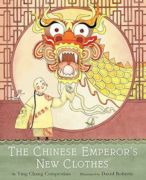
A young emperor, whose advisors have taken advantage of him, enlists the help of honest tailors to reveal their misdeeds in this retelling of the classic fairy tale. Includes historical notes and instructions for making a robe.
Materials from China

A young emperor, whose advisors have taken advantage of him, enlists the help of honest tailors to reveal their misdeeds in this retelling of the classic fairy tale. Includes historical notes and instructions for making a robe.
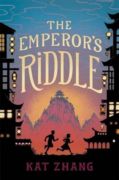
Mia Chen is on what her mother calls a Grand Adventure. She’s not sure what to make of this family trip to China, and didn’t want to leave her friends for the summer, but she’s excited about the prospect of exploring with her Aunt Lin, the only adult who truly understands her. Then Aunt Lin disappears, right after her old nemesis, a man named Ying, comes to visit. Mia knows that years ago, when Aunt Lin and Ying were sent to the Fuzhou countryside to work as laborers, the two searched for an ancient treasure together—one that still hasn’t been found. She’s suspicious that their shared history might be linked to Aunt Lin’s disappearance. When Mia discovers an old map filled with riddles in Aunt Lin’s room, she quickly pieces together her mission: find the treasure, find her aunt. Now, Mia, along with her big brother, Jake, must solve the clues to rescue the person she knows best in the world—and maybe unearth a treasure greater than her wildest dreams.
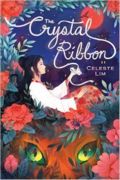
In the village of Huanan, in medieval China, the deity that rules is the Great Huli Jing. Though twelve-year-old Li Jing’s name is a different character entirely from the Huli Jing, the sound is close enough to provide constant teasing-but maybe is also a source of greater destiny and power. Jing’s life isn’t easy. Her father is a poor tea farmer, and her family has come to the conclusion that in order for everyone to survive, Jing must be sacrificed for the common good. She is sold as a bride to the Koh family, where she will be the wife and nursemaid to their three-year-old son, Ju’nan. It’s not fair, and Jing feels this bitterly, especially when she is treated poorly by the Koh’s, and sold yet again into a worse situation that leads Jing to believe her only option is to run away, and find home again. With the help of a spider who weaves Jing a means to escape, and a nightingale who helps her find her way, Jing embarks on a quest back to Huanan–and to herself.
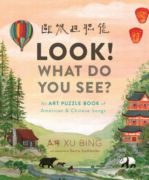
Seventeen traditional American and Chinese songs are written in artist Xu Bing’s signature Square Word Calligraphy.
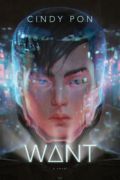
Jason Zhou survives in a divided society where the elite use their wealth to buy longer lives. The rich wear special suits, protecting them from the pollution and viruses that plague the city, while those without suffer illness and early deaths. Frustrated by his city’s corruption and still grieving the loss of his mother who died as a result of it, Zhou is determined to change things, no matter the cost. With the help of his friends, Zhou infiltrates the lives of the wealthy in hopes of destroying the international Jin Corporation from within. Jin Corp not only manufactures the special suits the rich rely on, but they may also be manufacturing the pollution that makes them necessary. Yet the deeper Zhou delves into this new world of excess and wealth, the more muddled his plans become. And against his better judgment, Zhou finds himself falling for Daiyu, the daughter of Jin Corp’s CEO. Can Zhou save his city without compromising who he is, or destroying his own heart?
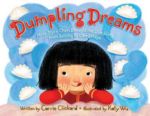
“The story of how Joyce Chen, a girl born in Communist China, immigrated to the United States and popularized Chinese cooking.”
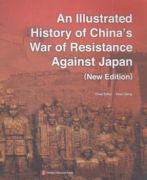
With historic pictures and materials organized in chronological order, the book presents the whole process of the Chinese People’s War of Resistance Against Japanese Aggression from 1931 to 1945, underlining the invincible spirit of the Chinese nation. Many of the 438 pictures in the book are published for the first time.
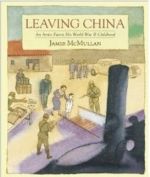
James McMullan was born in Tsingtao, North China, in 1934, the grandson of missionaries who settled there. As a little boy, Jim took for granted a privileged life of household servants, rickshaw rides, and picnics on the shore—until World War II erupted and life changed drastically. Jim’s father, a British citizen fluent in several Chinese dialects, joined the Allied forces. For the next several years, Jim and his mother moved from one place to another—Shanghai, San Francisco, Vancouver, Darjeeling—first escaping Japanese occupation then trying to find security, with no clear destination except the unpredictable end of the war. For Jim, those ever-changing years took on the quality of a dream, sometimes a nightmare, a feeling that persists in the stunning full-page, full-color paintings that along with their accompanying text tell the story of Leaving China.
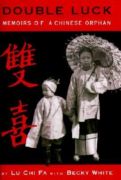
Tells the story of the author’s struggles after being orphaned at the age of three and how he held on to his dream of coming to the United States as he passed from one relative to another and was even sold to a Communist couple.
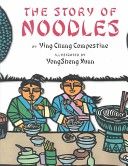
Left alone to prepare their family’s prize-winning dumplings for the annual cooking contest, the young Kang boys accidentally invent a new dish, “mian tiao,” or noodles, in a tale that includes a cultural note and a recipe for long life noodles.